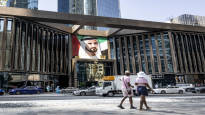ABU DHABI / DUBAI The city of dreams, where tens of thousands of people will soon live and work.
Housing, cars or the rest of life do not produce emissions.
Masdar City, the smart city of the oil-producing United Arab Emirates, has been marketed as such.
However, the reality is different.
As Masdari is approached, the first thing to come across are construction sites. The protective plastic flaps in the wind and you hardly meet anyone on the streets.
– Masdar is the first step in ecological thinking, assures the director responsible for the city’s sustainable planning Chris Wan.
It can be seen from everything that the construction of the city, which started 15 years ago, is still badly in progress. There are only about 4,000 inhabitants in the city, a tenth of what was originally planned.
A great greener or another kind of climate hero?
There are no guarantees of the success of a smart city project.
But the UAE is under suspicion right now for another reason as well.
The 28th UN climate meeting starts today in Dubai, United Arab Emirates, where the leaders of the states are trying to save the world from climate destruction.
The uproar has been caused only by the meeting arrangements.
First of all, the chairman of the meeting is the head of the state oil company of the United Arab Emirates Sultan al-Jaber. The company has announced that it will almost double oil pumping over the next few years.
The appointment of the meeting host has been criticized for example in the US Congress and the European Parliament.
This week, documents were also released to the public, according to which the United Arab Emirates intends to use the climate meeting to conclude new oil and gas agreements with other countries.
So are the conference host’s speeches about climate change just an illusion?
– It’s not just about greenwashing, says a German researcher and consultant living in the United Arab Emirates Timo Behr.
The United Arab Emirates just thinks it can solve the climate crisis in another way. This is how he could sum up his vision of what the oil country is doing now and in the future.
First of all, the area is always sunny.
– Some of the world’s largest solar power plants are already located here. They are also able to produce solar power at a lower cost than many others, says Behr.
A company owned by the United Arab Emirates invest in renewable energy around the world. It invests in solar power projects in Asia and Africa and in wind power in the North Sea.
In addition, the United Arab Emirates was the first Persian Gulf country to join the Paris climate meeting, Behr reminds. He believes that the oil state can even succeed in its promise to be zero emissions in 2050.
– They are genuinely involved in the development of sustainable energy, but they do it with business first, says Behr.
Others like the fact that the meeting is specifically in oil country. The largest oil countries must also be brought into the change.
The United Arab Emirates intends to be the last oil producing countries
So how does Behr explain the fact that the United Arab Emirates intends to pump oil far into the future at the same time?
– They think that the world is not ready to give up oil for a long time yet. And are likely going to be one of the last countries to continue pumping oil, Behr says.
Behr points to studies that show oil pumping causes less emissions in the Persian Gulf than in other parts of the world. Emirates likes to make this argument.
The share of oil in the national product in the Emirates is currently around 30 percent.
It seems clear that the oil state is ready to use methods in its climate policy that would not be accepted in, for example, Finland
The United Arab Emirates plans to lease land in Liberia, Africa, in order to buy emission units there that can offset emissions elsewhere.
In addition to greenwashing, many organizations have condemned the project as climate colonialism.
There are signs of a small change
When it comes to thinking about sustainable development in the Persian Gulf, we start from a long way back compared to, for example, Europe.
However, Chris Wan, director of sustainable planning for the Masdar Eco-City, believes that change is happening.
He tells an example of the processing of construction waste. Previously, construction waste was sent to desert landfills, now up to 90 percent of it can be recycled.
– In addition, people have started to separate their waste. You can see equipment that collects plastic bottles. This did not happen even 10 years ago.
